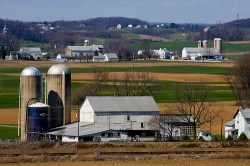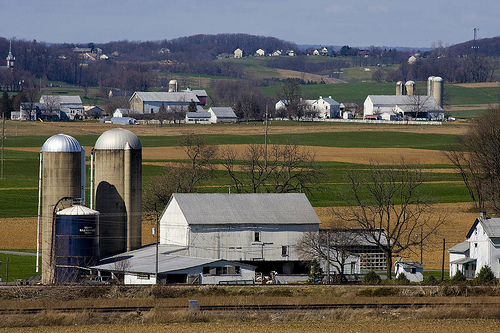
Photo by Jeff Cushner.
The 2012 Farm Bill finally appears to be moving forward. Sort of.
On Friday, the Senate Agriculture Committee released their draft of the half-trillion-dollar bill. But not much has actually changed for the better since the behind-closed-doors “Secret Farm Bill” process from last fall. Ag Committee members are still planning deep cuts to crucial conservation funding that both keeps farmers from planting up every acre of available land and ensures that their farming techniques don’t endanger clean water and air. Meanwhile, blustery boasts of eliminating farm subsidies are highly exaggerated: Last week, for example, Agriculture Secretary Tom Vilsack announced that “farm subsidy days are numbered.” But as was decided last fall, the committee simply plans to shuffle the bulk of “direct payment” subsidy dollars over to crop insurance, where they will continue to prop up the “Big Five” commodity crops (corn, soy, wheat, rice, and cotton).
Shortly after the draft was released, the Environmental Working Group (EWG) put out a statement claiming the bill “will do more harm than good.” Here’s more from EWG Senior Vice President for Agriculture and Natural Resources Craig Cox:
It needlessly sacrifices conservation and feeding assistance programs to finance unlimited insurance subsidies and a new entitlement program for highly profitable farm businesses. Rather than simply ending the widely discredited direct payment program, the Senate Agriculture Committee has created an expensive new entitlement program that guarantees most of the income of farm businesses already enjoying record profits. Replacing direct payments with a revenue guarantee program is a cynical game of bait-and-switch that should be rejected by Congress.
If that sounds cynical, it’s nothing compared to what the Republican-led House of Representatives is cooking up. (Both sides of the bipartisan Ag Committee are supposed to start working toward a consensus during a mark-up session on April 25-26.)
The House’s version of the bill would cut $180 billion from farm bill programs over the next decade. According to the Associated Press, that would include a whopping “$134 billion, or an average $13.4 billion a year, from the food stamp program.”
That’s a huge cut that would likely cause conditions for the poor in this country to get much worse. Science bears this out: A recent report [PDF] from the USDA’s Economic Research Service showed that food stamp (or Supplemental Nutrition Assistance Program or SNAP) benefits led to a 4.4 percent decline in poverty from 2000 to 2009. The current bill expires in September, and a final draft must be put in motion by Memorial Day if we’re going to get any bill this year at all. So these proposed food stamps cuts may just be a way for the GOP to stall or slow down the process. But if SNAP cuts like this did go through, the impact would be huge: One in six Americans — 50 million people — now rely on food stamps.
The GOP’s proposed cuts may make the Senate farm bill draft appear moderate by comparison, but both are a far cry from any of the hopeful versions released by Good Food Movement organizations such as the National Wildife Federation, EWG, the National Sustainable Agriculture Coalition (NSAC), the American Farmland Trust, and the Community Food Security Coalition. Not that they’re giving up; as we near the mark-up phase, many of the same groups are still working to insert citizens’ voices into the debate wherever possible.
NSAC (perhaps the closest thing the Good Food Movement has to a lobby of its own) is putting muscle behind two small marker bills that could add some small bright spots to the final 2012 Farm Bill: the Beginning Farmer and Rancher Opportunity Act and our Local Farms, Food, and Jobs Act. Beyond those important bills, the organization’s platform (which concerned eaters can still sign on and endorse) is calling for the protection of natural resources, wide-scale access to healthy food, and a restoration of “fiscal responsibility in farm policy.” They’re all crucial components that food reformers may have to put back on the shelf until the next farm bill.



